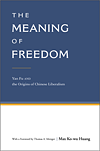This book is about how one of the leading intellectual architects of Chinese modernization, Yan Fu (1854–1921), introduced the Chinese intellectual world to the liberalism of John Stuart Mill partly by grasping Mill’s ideas, but also by misunderstanding and projecting them onto indigenous Chinese values, which in turn led to criticism and resistance. Rather than bending Western liberalism to the purposes of Chinese nationalism, Yan initiated a distinctively Chinese liberal tradition that became a major component of China’s modern political culture.
譯/編/作者簡介
Max Ko-wu Huang is a Research Fellow of the Institute of Modern History, Academia Sinica, Taipei. He specializes in the intellectual history of China in the late nineteenth and early twentieth centuries. His books include The Rejected Path: A Study of Liang Qichao’s Accommodative Thinking and The Raison d’étre of Freedom: Yan Fu’s Understanding and Critique of John Stuart Mill’s Liberalism.
書評
Max Huang’s study of Yan Fu is important for three
reasons: because of Yan Fu’s own considerable influence; because of what a
careful understanding of Yan Fu tells us about the opportunities and
challenges facing Chinese liberals then and now; and because Huang’s
multi-pronged methodology is extraordinarily revealing about the nature of
cross-tradition encounters generally. The MeaMs…





